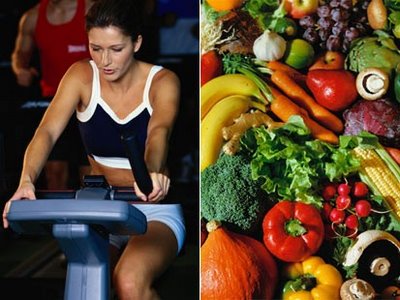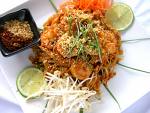Managing Your Diet for Fat Loss
 Last day, Brad Pilon began the interview by sharing his very own body transformation experience, as well as the research findings that inspired his fasting for fat loss book, Eat Stop Eat.
Last day, Brad Pilon began the interview by sharing his very own body transformation experience, as well as the research findings that inspired his fasting for fat loss book, Eat Stop Eat.
Today, in part 2 of my interview with Brad, we’ll cover a variety of topics, including a look at diet and the role of cheat meals, one crucial element to a successful body transformation, and lastly, how to gain the support of others.
Here we go…
*******************
Craig Ballantyne: Okay. Well, let’s ask you the age-old question here. When it comes to fat loss, diet versus exercise. What’s more important?
Brad Pilon: My personal opinion, and it’s what’s worked best for me and it’s what’s still working for me now is you DIET for fat loss and you’re in the GYM to build or maintain muscle. I think that in the end of the day controlling the diet is the best and easiest way to lose fat.
If you’ve got your diet under control and you’re maintaining your muscle mass in the gym and then you start adding in things like intervals then you’re really going to lose some weight. But if you’re just out there beating the pavement down and running mile after mile but you don’t have your diet under control, you’re typically just going to up the calories you eat and sort of maintain your weight.
So get the diet under control first. That’s your No. 1 step and then train to maintain the muscle mass. When those two things are kind of clicking for you, then that’s when you add in the intervals and everything else to kind of increase the fat burning.
Craig Ballantyne: Okay. And now going back to your diet and your low calories, did you include what people call a cheat meal and how often did you do it and what purpose did it serve you?
Brad Pilon: Yeah. I’m just looking through now. Funny thing is I think almost every time I cheat meal with Thai food. I don’t know why that is but it seems to be what I gravitated towards. Which makes me think the PURPOSE of the CHEAT MEAL was nothing more than FLAVOR. To give you an idea.
My meals were predominantly oatmeal, egg whites, tunas, meat, veggies and protein shakes so I think a little Thai food in there was probably just to keep me sane. I did this once a week. For some reason it was Thursday nights and I did it all the way up to about three weeks out from the show.
Craig Ballantyne: Okay. And were you putting a limit on how many calories you would eat at that cheat meal or could you just eat whatever you wanted and then move on to the next meal?
Brad Pilon: It seemed structured. Looking through it, it was actually literally my wife and I had the exact same meal every time so I got a beef dish, a chicken dish and pad thai. There’s no rice. It looks like that’s what I had every single Thursday so I don’t know if I ever particularly measured it.
I got a beef dish, a chicken dish and pad thai. There’s no rice. It looks like that’s what I had every single Thursday so I don’t know if I ever particularly measured it.
I just knew that that amount was definitely manageable because I mean that since I was measuring – I should mention that I had access to a body composition lab while I was doing this contest so I was actually measuring my body composition at least twice a week so I knew that that meal wasn’t hindering my progress.
Craig Ballantyne: Okay. And one thing that you obviously did was record everything. You recorded this maybe for not just to help you along but for scientific reasons as well. How important is that recording to you and to people in these types of transformations? Or even just to lose body fat? How important is it and what surprising purposes does it serve?
Brad Pilon: Next to nutrition and the workout I think RECORDING IS EVERYTHING. And the purpose which I really didn’t think of at the time but I’ve looked back at this book a number of occasions. And read through it. Saw what I did.
I have outlines here of things that I did and I did not like and I notice through this book that the No. 1 thing that was my biggest obstacle was actually travel and I’ve got my notes here of what went wrong when I traveled and how I think I’m going to do it next time I travel and what to fix, etc.
So it literally is probably one of the best resources I have for the way my body responds to diet and exercise. And that’s easily the best part is being able to look back at it.
Craig Ballantyne: Yeah. And I mentioned this in the interview I did with John Alvino who’s also part of this transformation experts is that it’s really important to get education about your body and to know as much as you can about training and nutrition but if you do something like what Brad’s done here and do a 12-week transformation and record everything and go hard for 12 weeks, it just makes the maintenance of a good body so much easier. Would you have any comments on that Brad?
Brad Pilon: Oh, absolutely. I mean like I said when I really started the contest I was 192. My actual start date when I started recording I was 188. I finished the contest at 171 and I haven’t been over 182 since. So from recording my diet and training for the contest I knew exactly what it takes to kind of get me lean. If I tend to be slipping a bit I can just look back at it.
And I know because I do have my breakdowns of both my body weight, body fat and lean body mass at approximately what weights and what leanness I should be so if I’m back at a weight and look in the mirror going, “I’m definitely not 11 percent body fat right now,” then I know that it’s not what I want.
So yeah. It’s really created a great ROADMAP for me to understand how my body reacts.
Craig Ballantyne: Okay. That’s great. And I just want to focus on the point that Brad did this for 12 weeks. It’s not like you have to study for years and years and years to know how your body works.
If you just put a concentrated effort into understanding how your body works for 6, 12, 18 weeks you’re going to know so much and it’s going to guide you through the rest of your life and you’re going to know how you respond to a certain type of training program. You respond to a certain type of meal.
And not just in terms of body fat. But also in terms of mental energy, whether you work better. Brad’s going to talk about fasting and the mental energy from that benefits.
But just putting together this one simple logbook that Brad has really can guide him to health and fitness for the rest of his life.
Now, Brad, you did make a good comment there about you had TROUBLES WITH TRAVEL. Now would you like to share some of the things that came up that ended up being a problem and then how you would avoid those in the future. Because I know a lot of people reading this information probably have travel problems.
Brad Pilon: Absolutely. My main travel problems was when you’re doing international flights you’ve got to be at the airport three hours in advance and for some reason if you’re doing an international flight and you’re there on time you’re there through security and everything in about 20 minutes and you’re just sitting there waiting.
And I would pack food and I would pack my water and about an hour into my waiting it would be gone and then about an hour and a half I’m doing the walk-around and there’s a Dairy Queen and there’s a Cinnabon and okay, I’m not touching them. I’m dieting.
half I’m doing the walk-around and there’s a Dairy Queen and there’s a Cinnabon and okay, I’m not touching them. I’m dieting.
And then the plane’s about to leave and you’re like I should probably get some food into me. You start rationalizing. I really should have some food in me. It’s probably not a good idea to travel on an empty stomach. There’s absolutely no reason why you can’t but I thought at the time that made sense so all of a sudden boom! I’m downing a Cinnabon and I’m on the plane going oh, man, “Why’d I do that?”
And then you get off the plane and then unfortunately it runs into more problems – while at home I had an amazing support network of people supporting me. When you’re traveling you’re probably in a new city and people want to show you the town and they want to take you out.
So again it becomes the obstacle of how do you order in a restaurant and how to deal with desserts and how to deal with the drinking that may or may not happen after the restaurant so it was a lot of learning on really how to explain to people what you’re doing and why you’re doing it.
I’ll tell you one thing.
That got a lot EASIER as the diet went on because in the beginning part you don’t get a lot of support because people haven’t really seen the changes but towards the end of the diet when you explain to people what you’re doing and they already SEE THE RESULTS and they’re apt to SUPPORT YOU almost right away.
Next, find out how to you ensure you stick with your plan all the way to the end of your transformation.